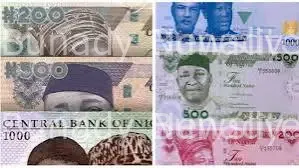The Nigerian Central Bank (CBN) has replied replied the House of Representatives, saying no deadline is fixed for the circulation of old naira notes. The lower chamber on Thursday directed the apex bank to begin the gradual withdrawal of the old notes from circulation, the CBN dismissed the report that the old N200, N500, and N1,000 banknotes will cease to be legal tender on December 31, 2024.... CLICK TO READ THE FULL NEWS HERE▶▶
This call was made after a motion was raised by Adam Victor Ogene (LP, Anambra).
Leading the debate on the motion, Ogene recalled the hardship, frustration, controversy and chaotic situation occasioned by the Central Bank of Nigeria (CBN) change of currency in 2023, that affected validity of the old N200, N500 and N1,000 Naira notes at the time that resulted in litigations.
He also recalled that the scarcity of the new currency notes led to untold hardship in the nation as a result of the CBN’s inability to supply new versions of the changed currency notes.

He said “going by the Supreme Court’s subsequent ruling and order, the N200, N500 and N1,000 notes shall cease to be legal tender, medium of exchange for goods and services in Nigeria, and shall also cease to be in circulation as from January 1, 2025.
He expressed concern that the Central Bank of Nigeria (CBN) has not shown any sign of sensitization or kick-started any awareness programme to remind Nigerians about this important economic policy in order to make them prepare for the deadline of 31/12/2024.
He said Nigerians will be plunged into more chaotic situations than what happened in February, 2023, when the old N200, N500 and N1,000 notes shall cease to be legal tender and medium of exchange for goods and services as from January 1, 2025.
According to him, the Central Bank of Nigeria (CBN) ought to have started public awareness, such as Jingles, Television and Radio announcements, Social Media postings, Flyers, Daily Newspapers and Periodic Magazines publications three (3) months before the deadline but now with about two months to the deadline, yet nothing to show that the apex bank is prepared for the exercise.
He also expressed concern that rather than a gradual withdrawal, the Central Bank of Nigeria (CBN) is still comfortably releasing the old N200, N500 and N1,000 notes mixed with the new N200, N500 and N1,000 notes for business transactions in Nigeria, instead of the gradual mopping up of the old notes from circulation or ordering commercial banks to do so by issuing out only the new notes.
However, a press statement issued by Sidi Ali, Hakama (Mrs.) CBN Ag. Director, of Corporate Communications late on Thursday described the news as false which was targeted to disrupt the country’s payment system.
The apex bank maintained that there is a subsisting order of the Supreme Court which granted the prayer of the Attorney-General of the Federation and Minister of Justice to extend the use of old Naira banknotes indefinitely and any directive otherwise will be illegal.
The statement continued: “Similarly, the CBN’s directive to all its branches to continue to issue and accept all denominations of Nigerian banknotes, old and re-designed, to and from deposit money banks (DMBs) remains in force.
“It will be recalled that the Supreme Court ordered that the old series of N200, N500, and N1,000 banknotes shall continue to be legal tender alongside the redesigned versions. Accordingly, all banknotes issued by the Central Bank of Nigeria (CBN) will continue to remain legal tender indefinitely.
“We, therefore, advise members of the public to disregard suggestions that the said series of banknotes will cease to be legal tender on December 31, 2024. We urge Nigerians to continue to accept all Naira banknotes (old or redesigned) for their day-to-day transactions and handle them with the utmost care to safeguard and protect their lifecycle.
“Furthermore, the general public is encouraged to embrace alternative modes of payment, echannels, in order to reduce pressure on the use of physical cash.”











